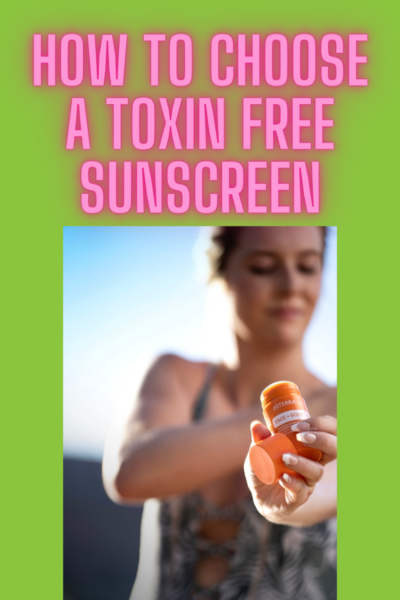Do you use a toxin free sunscreen? If not, you really must start. Especially if you have an autoimmune condition, like most of the people who read this blog. Toxins in sunscreens can end up causing as much if not more damage than sunburns.
However, not all sunscreens are created equal. Many conventional sunscreens contain potentially harmful chemicals that can penetrate the skin and cause adverse effects. To ensure optimal skin health, it’s crucial to choose a toxin-free sunscreen. In this blog post, we’ll guide you through the process of selecting a sunscreen that provides effective protection without compromising your well-being.
Understand the Importance of Toxin-Free Sunscreens:
- Toxin-free sunscreens are formulated without chemicals that may have harmful effects on the skin and overall health. These chemicals, such as oxybenzone, octinoxate, and parabens, have been linked to hormone disruption, skin irritation, and environmental damage. Opting for toxin-free alternatives ensures that your skin receives the protection it needs while minimizing potential risks.
Look for Mineral-Based Sunscreens:
- Mineral-based sunscreens, also known as physical sunscreens, utilize natural minerals like zinc oxide and titanium dioxide to create a physical barrier that reflects and scatters UV rays. Unlike chemical sunscreens that absorb the sun’s rays, mineral sunscreens provide broad-spectrum protection without the need for harmful chemicals. Look for sunscreens that contain non-nano particles to ensure minimal absorption into the skin.
Check for Broad-Spectrum Protection:
- Effective sunscreens protect against both UVA and UVB rays. UVA rays can prematurely age the skin, while UVB rays can cause sunburn. When selecting a sunscreen, ensure it offers broad-spectrum protection by looking for the words “broad-spectrum” or the UVA symbol on the label. This indicates that the product protects against both types of rays.
Read the Ingredients List:
- To identify a toxin-free sunscreen, take the time to read the ingredients list. Look for sunscreens that contain natural and organic ingredients, as they are less likely to contain harmful chemicals. Avoid sunscreens that contain oxybenzone, octinoxate, retinyl palmitate (a form of vitamin A), and parabens. Instead, choose products that include ingredients like zinc oxide, titanium dioxide, shea butter, coconut oil, aloe vera, and green tea extract. I personally also like sun screen with essential oils in it.
Consider Your Skin Type:
- Different skin types have different needs when it comes to sunscreen. If you have sensitive or acne-prone skin, opt for sunscreens labeled as “hypoallergenic” or “non-comedogenic” to minimize the risk of skin irritation or clogged pores. Additionally, choose formulas that are fragrance-free and avoid common allergens. For oily skin, look for lightweight, oil-free formulations that won’t leave a greasy residue.
Seek Third-Party Certifications:
- To further ensure the quality and safety of the sunscreen you choose, look for third-party certifications or endorsements. Certifications such as the Environmental Working Group’s (EWG) “EWG Verified” or the National Eczema Association’s “Seal of Acceptance” indicate that the product has undergone rigorous testing and meets specific safety standards. However, this can be helpful but aren’t always necessary.
Don’t Forget About Environmental Impact:
- In addition to personal health considerations, it’s essential to choose a sunscreen that is environmentally friendly. Some chemical sunscreens contain ingredients that contribute to coral reef bleaching and have negative impacts on marine ecosystems. Opt for reef-safe sunscreens that are free from oxybenzone and octinoxate to protect both your skin and the environment.
Conclusion:
Choosing a toxin-free sunscreen is a vital step towards maintaining healthy skin and safeguarding your overall well-being. By opting for mineral-based sunscreens, checking for broad-spectrum protection, reading ingredient lists, considering your skin type, and looking for mineral based sunscreen not chemical based.

Did this help you? If so, I would greatly appreciate a share on Facebook, twitter, linkedin, or pinterest.
My Favorite Products (Affiliate links- if you make a purchase I may earn a small commission)
Thrive Market - healthy gluten free, sugar free and speciality online food and household products
Silk and Sonder Monthly Journals and Planners
My Portable Infrared Sauna
Self Care Journal
Martie discounted food
Olipop - healthy soda with probiotics and prebiotics
Digestion Kit
Stress Oils








